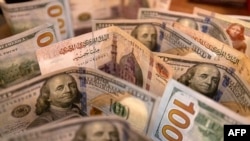As a rising U.S. dollar puts increasing pressure on Egypt's national currency, several Egyptian banks announced this week that they were offering certificates of deposit with 25% interest rates.
That news, rather than calming economic markets, appears to have added to pressure on the Egyptian pound. It has dropped from a level of around 15 pounds to the dollar earlier this year to what some financial outlets said Wednesday was a record low of 26 to the dollar.
The black market rate can be higher. Efforts by this correspondent to purchase U.S. dollars uncovered at least one black marketeer selling dollars for 33 Egyptian pounds. Egyptian law punishes black market selling of the dollar, and few traders want to go public with their rates.
Egypt's need to service its high national debt in U.S. dollars is sucking dollars out of the commercial circuit. Egypt imports 65% of its food staples, paid for mostly in U.S. dollars. Wholesale food buyers must purchase imported foodstuffs like canned tuna, coffee, nuts, Kalamata olives and other items at higher rates as they vie for a limited supply of U.S. dollars on the market, both legal and illegal.
Consumers, in turn, are forced to pay increasingly higher prices at the cash register, making their lives even more miserable since they continue to be paid in Egyptian pounds.
Anecdotally, some reports indicate that capital has fled Egypt because of rising interest rates in the U.S. Those rising rates have also made servicing Egypt's debt even more onerous. It needs $42 billion a year to service a debt of $267 billion, and a recent loan of $3 billion from the International Monetary Fund has done little to reduce the sting.
One economist told Egyptian media that most of the pressures on the Egyptian economy are coming from outside factors, including the war between Russia and Ukraine, COVID-19, rising world food prices, and inflation in many developed countries.
Egyptian political sociologist Said Sadek told VOA that Egypt and many other Arab countries buy wheat, a major staple of the economy, from both Russia and Ukraine, and that rising wheat prices, along with rising prices of other foodstuffs, sent inflation rates to around 20% last year, contributing to economic pressures in the country.
Some speculation of a default by Egypt on its debt has increased pressure on the Egyptian pound. But Sadek said that "a revolution in Egypt is very unlikely" despite the increasing economic pressures, since Egyptians "tried that formula in 2011," when they overthrew veteran leader Hosni Mubarak, "only to discover that it did not improve their economic situation."
Paul Sullivan, a Washington-based Middle East analyst with the Atlantic Council, told VOA that "the lives of average Egyptians, who are mostly poor and getting poorer, are much more difficult. Importing goods, including animal feed, has become much more expensive, and getting the dollars to import has been far more difficult than in the recent past."
"The last year," he said, "has been more expensive and stressful than recent years for most Egyptians. Egyptians are resilient people, survivors even in the most difficult times, but I have to wonder how much more they can take."




